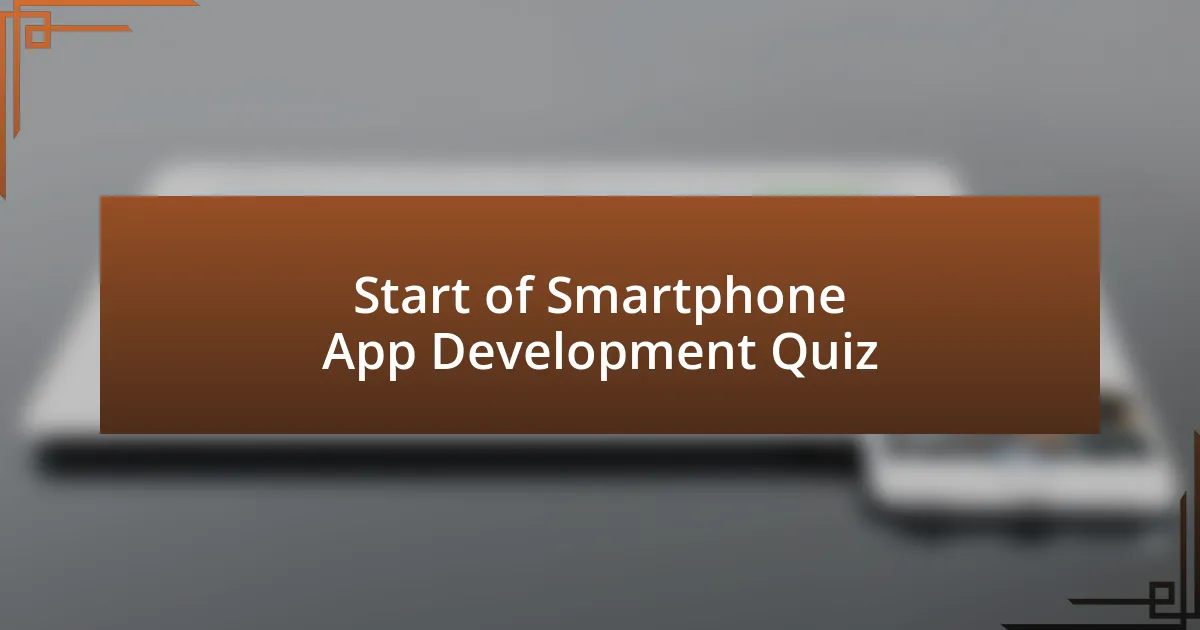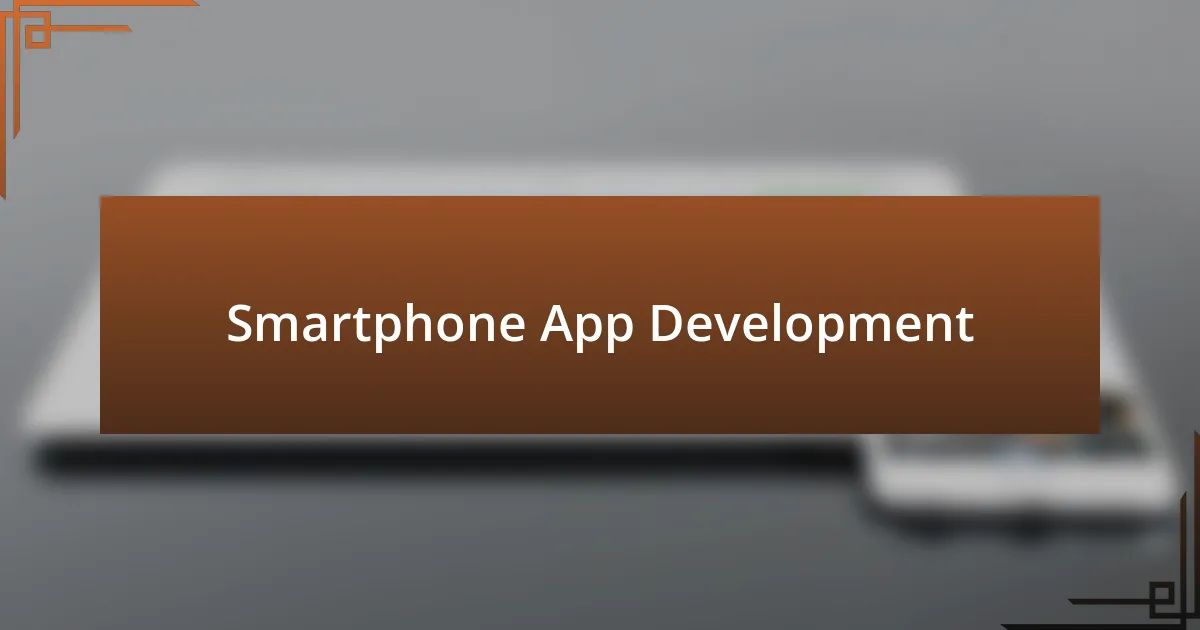
Smartphone App Development Quiz

Start of Smartphone App Development Quiz
1. What is the primary purpose of testing in smartphone app development?
- Testing is solely for making the app look good.
- Testing is executing Software for the purpose of finding defects.
- Testing is done only once at the end of development.
- Testing is only for user interface design approval.
2. Which programming language is commonly used for iOS app development?
- Ruby
- Python
- JavaScript
- Swift
3. What does an SDK stand for in mobile app development?
- Security Development Kit
- Software Development Kit
- Software Deployment Kit
- System Design Kit
4. What tool is typically used for version control in mobile app development?
- Photoshop
- Git
- Dropbox
- Notepad
5. Which mobile platform is known for its App Store?
- iOS
- Android
- Windows
- BlackBerry
6. What is the role of a mobile app emulator?
- It simulates a mobile device on a computer.
- It provides internet access for mobile devices.
- It collects user data from mobile devices.
- It manages app updates on mobile devices.
7. What does the acronym API represent in mobile applications?
- Application Process Integration
- Automated Processing Interface
- Advanced Programming Instruction
- Application Programming Interface
8. What is the significance of user experience (UX) in app development?
- Reduction in app development costs.
- User satisfaction and usability.
- Better battery life on devices.
- Increased server performance.
9. Which framework is widely used for cross-platform mobile app development?
- React Native
- Xamarin
- Flutter
- SwiftUI
10. What is the main feature of version control systems?
- Encrypting project data
- Tracking changes to files
- Compiling source code
- Storing files on the cloud
11. What data format is commonly used for exchanging information in mobile apps?
- HTML
- CSV
- JSON
- XML
12. What is the function of responsive design in mobile app development?
- It removes unnecessary features from the app.
- It ensures the app only works on tablets.
- It makes the app only usable in landscape mode.
- It allows the app to adapt to different screen sizes and orientations.
13. Which component manages the UI in Android applications?
- Service
- ContentProvider
- Activity
- BroadcastReceiver
14. How do mobile apps typically handle user authentication?
- Require users to provide their social media profiles.
- Simple username and password input only.
- Rely solely on phone numbers for authentication.
- Use of tokens and encryption for secure access.
15. What is the common backend architecture for mobile applications?
- SOAP API
- GraphQL
- FTP Server
- RESTful API
16. What is the purpose of a wireframe in app development?
- To write the final code for the app.
- To outline the app`s layout and functionality.
- To launch the app in app stores.
- To test the app`s performance.
17. What does the term `native app` refer to in mobile development?
- A mobile application developed for a specific platform.
- A desktop application for Windows OS.
- A web application accessible via a browser.
- A game designed for social media platforms.
18. Which platform uses Swift as its primary programming language?
- Windows
- Linux
- Android
- iOS
19. What does the term `wireless testing` refer to in mobile apps?
- Analyzing the market competitiveness of apps.
- Checking app compatibility with desktop systems.
- Testing the functionality of mobile apps without physical connections.
- Ensuring app interfaces are visually appealing.
20. What is a common database used in mobile app development for local storage?
- MySQL
- MongoDB
- Oracle
- SQLite
21. What is the significance of app store optimization (ASO)?
- It collects user data for analytics purposes.
- It ensures app compatibility with all devices.
- It eliminates bugs and errors in code.
- It improves app visibility and increases downloads.
22. What type of testing checks the performance of mobile applications?
- Security Testing
- Performance Testing
- Usability Testing
- Functional Testing
23. What does an app`s `front-end` refer to?
- The user interface elements of an app.
- The operating system framework.
- The backend server processing.
- The app`s database functionality.
24. How do developers typically ensure app security?
- Using colorful graphics and animations.
- Focusing solely on user interface design.
- Implementing authentication and authorization measures.
- Making sure the app runs on all devices.
25. What is the purpose of push notifications in mobile apps?
- To display advertisements for monetization purposes.
- To collect data on user behavior for analysis.
- To increase battery consumption by running background processes.
- To inform users with timely updates and alerts.
26. What is meant by `mobile app lifecycle`?
- The hardware specifications required for a mobile app.
- The programming languages used in creating mobile apps.
- The stages a mobile app goes through from development to retirement.
- The user interface designs for mobile applications.
27. Which software is often used for mobile app prototyping?
- Visual Studio
- Eclipse
- Figma
- Notepad
28. What do app analytics tools track in mobile development?
- User interface animations
- Device battery levels
- User engagement metrics
- App design reviews
29. What is the use of Firebase in mobile app development?
- To create user interfaces and layouts.
- To provide backend services for mobile apps.
- To manage hardware resources of the device.
- To compile code into machine language.
30. What is the benefit of using cloud services in mobile applications?
- Scalability and storage.
- Increased app size.
- Limited offline capabilities.
- Higher battery consumption.

Quiz Completed: Congratulations!
Well done on completing the quiz on Smartphone App Development! We hope you enjoyed the challenge and learned valuable insights. From understanding the basics of app design to recognizing the importance of user experience, you’ve taken a step toward mastering this exciting field.
This quiz has equipped you with essential knowledge, including the different stages of app development and the tools available for developers. You’ve gained awareness of best practices in coding and design, which are crucial for creating successful applications. Each question has aimed to deepen your understanding and spark your curiosity about the world of mobile technology.
To further enhance your learning journey, we invite you to explore the next section on this page. It contains a wealth of information about Smartphone App Development. This resource will expand on the concepts you’ve just learned and provide practical tips to help you on your development path. Dive in and continue your exploration of this fascinating topic!

Smartphone App Development
Overview of Smartphone App Development
Smartphone app development involves creating software applications for mobile devices. These applications can run on various platforms, primarily iOS and Android. The development process typically includes stages such as planning, design, development, testing, and deployment. With millions of apps available, businesses and individuals seek to develop unique applications to meet user needs and enhance functionality. The market for mobile apps continues to grow, reflecting the increasing reliance on smartphones in daily life.
Types of Smartphone Apps
Smartphone apps can be categorized into three main types: native, hybrid, and web apps. Native apps are built specifically for a single platform, like iOS or Android, offering optimal performance and user experience. Hybrid apps combine elements of both native and web applications, allowing cross-platform compatibility while leveraging web technologies. Web apps are accessed through web browsers and do not require installation but may have limitations in performance and features. Each type serves different business goals and user requirements.
Key Development Tools and Frameworks
Popular tools and frameworks for smartphone app development include React Native, Flutter, and Xamarin. React Native allows developers to create cross-platform apps using JavaScript, enhancing code reusability. Flutter, developed by Google, enables high-performance applications with a single codebase and rich UI components. Xamarin integrates with Microsoft’s .NET framework, providing a robust platform for cross-platform development in C#. Each tool offers unique advantages depending on the project’s specific needs.
Importance of User Experience (UX) Design
User experience (UX) design is crucial in smartphone app development. A well-designed app ensures usability, accessibility, and satisfaction for end-users. Effective UX design includes user research, wireframing, prototyping, and user testing. These processes help identify user needs and preferences, leading to more intuitive interfaces and seamless interactions. Positive UX can significantly impact user retention and app ratings, ultimately influencing the app’s success in a competitive market.
Monetization Strategies for Smartphone Apps
Monetization strategies are essential for generating revenue through smartphone apps. Common approaches include in-app purchases, advertisements, subscription models, and paid downloads. In-app purchases allow users to buy additional features or content within the app. Advertisements provide income through ad placements but can affect user experience if overused. Subscription models offer ongoing services or content for a recurring fee. Each strategy has its merits and can be chosen based on the target audience and app functionality.
What is smartphone app development?
Smartphone app development is the process of creating software applications specifically designed for mobile devices. This includes designing, programming, testing, and deploying apps on platforms such as iOS and Android. Research shows that as of 2023, there are over 3 million apps available on the Google Play Store and around 2 million on the Apple App Store, reflecting the scale and demand for mobile applications.
How does smartphone app development work?
Smartphone app development commonly follows a structured process that includes planning, design, development, testing, and deployment. Developers typically use programming languages like Swift for iOS or Kotlin for Android. According to industry norms, a typical app development cycle can take several months, depending on its complexity and features.
Where can smartphone apps be published?
Smartphone apps can be published on various platforms, primarily the Google Play Store for Android and the Apple App Store for iOS. Each platform requires adherence to specific guidelines and regulations. For instance, the Apple App Store has over 30% acceptance rates for app submissions, reflecting its rigorous review process.
When should a business consider developing a smartphone app?
A business should consider developing a smartphone app when it seeks to enhance customer engagement, improve service delivery, or tap into mobile commerce. Research indicates that 54% of users prefer mobile apps over mobile websites, showcasing the potential impact on consumer satisfaction and sales performance.
Who are the key players in smartphone app development?
The key players in smartphone app development include app developers, project managers, UX/UI designers, and quality assurance testers. The global app development market was valued at approximately $300 billion in 2023, highlighting the significance of these professionals in creating successful applications.




